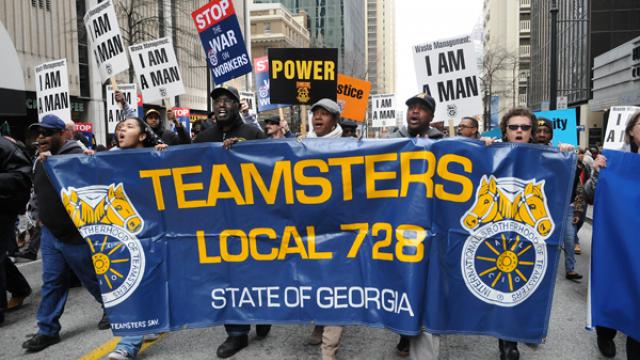
Photo: Chaz Bolte/The We Party. A coalition of Occupiers, Tea Party Patriots and community leaders came together to defeat SB 469.
Late last week, a groundbreaking coalition of unions, immigrant and social justice organizations, Occupy Atlanta, Tea Party Patriots, faith-based communities and others turned out against – and defeated – Georgia’s anti-free speech Senate Bill 469, sending a resounding message to state and federal legislators about the limits to challenging Americans’ first amendment rights.
In a state that ranks dead last on ethics according to the State Integrity Investigation released last month, Georgia’s anti-speech and anti-union bill was supported by the profligate spending, holiday-hungry State Sen. Don Balfour along with the Georgia Chamber of Commerce and powerful members of the corporate uber-lobby conglomerate American Legislative Exchange Council, or ALEC.
The defeated bill, which would have outlawed picketing and reduced payrolls for organized labor, also contained provisions that would have made it an aggravated misdemeanor to protest or engage in civil disobedience on or near private property, punishable by multiple-year prison sentences and fines of $1,000 per day. The coordinated action by occupiers, Tea Party Patriots, AFL-CIO representatives, church, immigration and civil rights leaders and others opposed to the bill marked a new stage in the growing national call for civil and economic rights.
As relayed by Occupy Atlanta, here is how last week’s battle to kill SB 469 was won:
1. We paid attention. The alert about SB 469 came from the unions first - but people in Occupy Atlanta and other groups immediately started reading the text of the bill, researching its origins, looking at ALEC connections, looking at who was sponsoring it in the legislature, and generally learning as much as we could. For some of us, it was our first close look at how the Georgia General Assembly functions. We learned fast and shared knowledge.
2. We showed up. The committee meetings in both the Senate and House were packed by representatives of many unions, Occupy Atlanta, Grandmothers for Peace, etc. There were people in the gallery and watching online when SB 469 was debated in the Georgia Senate and when it came up in the House. We had multiple rallies, speak-outs in the rotunda, and haunted the halls of the Capitol building.
3. We got organized. Once the bill passed the Senate, Occupy Atlanta had an emergency General Assembly to discuss what to do; we devoted the next regularly scheduled GA to planning as well. That meant that when word came back from the forming coalition with a date for a mass rally, we were ready to launch an all-out effort. Meanwhile the other groups were having their own meetings and planning sessions.
4. We got the word out: Thousands of flyers, MARTA outreach, petitions, Tweets, phone banks, Facebook posts, radio interviews, PSAs, articles, messages projected onto buildings, you name it - along with many, many personal conversations.
5. We formed a broad coalition. At the first mass meeting to plan the March 17 rally, held at the I.B.E.W. hall, representatives from forty different organizations showed up, some of whom had never sat down in a room together. Different groups brought different strengths; the unions were able to bring numbers by mobilizing their membership, organizational resources, long-standing relationships in the community, and the ability to bridge between different community groups. The social justice groups had decades of experience with civil disobedience and were able to connect the dots between SB 469 and other repressive legislation being pushed through the General Assembly. Occupy Atlanta brought our usual madcap flair, comfort with a variety of media, and ability to engage people who were not already politically involved; some of the people who showed up due to our outreach had never been to anything similar before. Everybody brought something of value.
6. We kept reaching out. The original coalition was like a who’s-who of left-liberal politics in Georgia; but we didn’t stop there. Several people from both the unions and Occupy Atlanta talked to local Tea Party contacts; that led to them entering the conversation which made a real difference. We also spoke to legislators, both those who were sympathetic from the beginning and those whom we were able to convince that the bill was unconstitutional and damaging to Georgia.
7. We made contingency plans and were ready to escalate when necessary and back off when appropriate. The bill was moving so fast we didn’t have time to wait and see before deciding what we would do next; this led to us being prepared for civil disobedience at a certain point, but when the situation shifted we were able to adjust our plans and preserve focus and unity while being flexible.
8. We persisted. Sine Die alone, the last day of the legislative session, was fourteen hours of citizen lobbying and nail-biting, preceded by a month of the same. We stayed until, in State Sen. Vincent Fort’s words, the last dog howled.
9. We stuck together. Various iterations of changes in the bill were intended to peel off parts of our coalition in a “divide and conquer” tactic. It didn’t work. At one point a news reporter kept asking Justin from Occupy Atlanta about the fact that the protest parts of the bill had been stripped. He said, “The unions were there for us, we’ll be there for them.” Debbie Dooley of the Tea Party Patriots kept lobbying against the bill even after it had become strictly a union-busting measure as well.
…And then we won.
3 WAYS TO SHOW YOUR SUPPORT
- Log in to post comments













